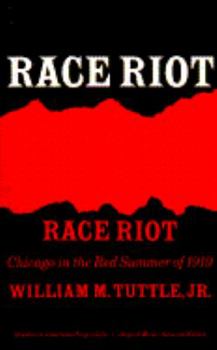Race Riot: Chicago in the Red Summer of 1919
Select Format
Select Condition 
Book Overview
"The origins of the Chicago race riot of 1919 are to be found, not in high-level policy, but in gut-level animosities between black and white people who were generally inarticulate and... This description may be from another edition of this product.
Format:Paperback
Language:English
ISBN:0689702876
ISBN13:9780689702877
Release Date:January 1972
Publisher:Atheneum Books
Length:305 Pages
Weight:0.80 lbs.
Customer Reviews
4 ratings
Explosion of Black Rage
Published by Thriftbooks.com User , 16 years ago
Most people view race relations in the United States in the context of their own times. I would even be willing to bet that most non-black Americans know little about any civil rights issues that roiled the country in the days before they were born. Since I was coming of age in the late 1960s, many of my views on the subject had been shaped for better or worse by events that took place during that turbulent decade. But I always knew there had to be more to the story than the simplistic bad Southerner/good Northerner hogwash most of us were fed in school. Race Riot offers those of open minds an opportunity to learn that racism is a lot more complicated than a mere dislike of a group because of skin color. My family is from Chicago and I got my copy of this book from my maternal grandfather who was interested in all things Chicago and who according to notes in the front of the book remembered exactly where he was when the troubles began. This made it doubly exciting for me to read. In Race Riot, author Tuttle starts by recounting the incident that ignited the racial tinderbox that Chicago had become in the years leading up to the riot's eruption. He covers in great detail the issues of overcrowding, the massive infux of rural Southern blacks and their subsequent ghettoization, inter-ethnic labor competition, the cynical policies of Chicago's city leaders, and any social and economic factors that led to polarization of feelings between the races. He writes of the New Negro, recently back from the war in Europe, who had heightened expectations of social and economic progress. And he writes of corrupt politicians, black and white, whose graft and conniving had helped turn black neighborhoods into crime-ridden cesspools of vice and degeneracy. Most importantly, Tuttle gives the reader a glimpse of the history of race-related riots in the US dating from the days before the Civil War on up through the ones in the early 20th century that did so much to fuel a sense of frustration among Chicago's black residents. Race Riot is not a perfect book by any means and often is steeped in a pioneer style of mealy-mouthed political correctness, but it is still a valuable tool for students of the history of black-white relations in the United States. Tuttle doesn't bore the reader with irrelevant details but the book is heavily footnoted so those who want to learn more have a multitude of sources to which they can turn. If this is a subject that interests you, then you are sure to find this an absorbing read.
A Fine Work, Highly Recommended
Published by Thriftbooks.com User , 18 years ago
This book is an excellent account of the causes and aftermath of the Chicago Race Riot of 1919. Tuttle manages to pull together an array of primary sources including newspaper articles, meeting minutes, and first-hand accounts, both written and oral, to tell the story of the Chicago Race Riot. His goal is to write history "from the bottom up", and in this, he is successful. My only complaint is that by focusing heavily on individual accounts and exceptions to the norm, Tuttle misses out on some broader historical trends. However, since his stated goal is to write a study of "individuals as well as groups", this approach is understandable, and, in places, even desirible. This is one of the only books on the subject of the Chicago Race Riot of 1919, and, as such, it should be of interest to anyone studying the history of Chicago or the history of race relations in the United States.
best (and only) book on the 1919 Chicago riots
Published by Thriftbooks.com User , 24 years ago
As far as I know, this is the only book on the subject, which is an absolutely fascinating one for me. It is well written and very coherent, but unfortunately the author spends most of the book of the causes and results of the riots, not on the riot itself. Still, this is a wonderful book, essential for anybody interested in Chicago history.
Concise, thoughtful inquiry--refreshing and bold
Published by Thriftbooks.com User , 25 years ago
Not only does William M. Tuttle, Jr. show every virtue of a lover of history, but he does so with enough clear, crisp understanding that every point seems to sympathize with the mind of even an armchair historian of Black-American mores.





